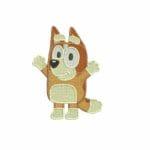Want to know how long your energetic Aussie Cattle Dog will be by your side? This comprehensive guide explores the typical lifespan of Australian Cattle Dogs, the factors influencing their longevity, and actionable steps you can take to help your furry friend enjoy a long and healthy life. We’ll delve into common health concerns, preventative care, and the vital role you play in ensuring your Blue Heeler thrives for many years to come.
Understanding Your Aussie’s Lifespan: More Than Just an Average
The typical lifespan for an Australian Cattle Dog is generally considered to be between 12 and 15 years. However, this is merely an average. Some Aussies may reach their senior years sooner due to unforeseen health challenges, while others, with exceptional care and potentially fortuitous genetics, may happily surpass this benchmark. Indeed, there are even documented cases of Aussies living well into their late teens, and the extraordinary case of Bluey, who lived to the remarkable age of 29 years and 5 months, showcases the potential for exceptional longevity, albeit exceptionally rare. [https://www.lolaapp.com/What is the longest living Australian Cattle Dog?] This highlights the significant interplay between genetics and the quality of care provided.
The Factors Shaping Your Dog’s Years: A Holistic Approach
Numerous factors influence your Australian Cattle Dog’s lifespan. Understanding these factors is the first step towards proactive health management.
Genetics: The Blueprint of Life
Genetics plays a significant role in determining your dog’s predisposition to certain health issues. Some Australian Cattle Dogs are genetically more prone to conditions like hip dysplasia (a malformation of the hip joint), progressive retinal atrophy (PRA, affecting eyesight), and deafness. Responsible breeding practices, which involve screening parent dogs for these conditions, can significantly reduce the risk of your puppy inheriting these problems. [https://www.lolaapp.com/How long do Australian Cattle Dogs mixes live?] However, even with responsible breeding, some genetic predispositions may still arise.
Nutrition: Fueling a Long and Healthy Life
Nutrition is paramount. A high-quality, balanced diet, appropriate for your dog’s age and activity level, provides the essential building blocks for a strong immune system and overall well-being. Obesity is a major concern; overweight Australian Cattle Dogs are at a significantly increased risk for a range of health problems, many of which can shorten their lifespan. [https://www.lolaapp.com/Factors Affecting Australian Cattle Dog Lifespan: A Summary] Therefore, maintaining a healthy weight throughout your dog’s life is absolutely crucial. Portion control and selecting a food formulated for your dog’s specific needs (age, activity level) are vital steps.
Exercise: The Dynamic Duo of Physical and Mental Well-being
Daily exercise is essential for Australian Cattle Dogs, a breed renowned for its energy and intelligence. Regular physical activity helps maintain a healthy weight, strengthens muscles and bones, and provides crucial mental stimulation. However, it’s crucial to avoid overexertion, particularly in puppies and senior dogs. Too much strenuous activity can strain joints and contribute to long-term health issues. Aim for a balanced exercise routine tailored to your dog’s age and physical condition, combining brisk walks, playtime, and activities that challenge their mental capabilities. This approach will keep your dog happy and healthy.
Veterinary Care: Preventative Measures and Early Detection
Regular visits to your veterinarian are not merely recommended; they are essential. Preventative care, including vaccinations and parasite control, should be a cornerstone of your Australian Cattle Dog’s healthcare plan. Moreover, routine checkups enable early detection of potential health problems. Early diagnosis significantly enhances the likelihood of successful treatment and improves your dog’s quality of life. Specific tests, such as BAER (Brainstem Auditory Evoked Response) hearing tests for puppies, particularly those from lines with a history of deafness, are also highly recommended. [https://www.lolaapp.com/Aussie-Specific Health Challenges: Knowing the Risks]
Common Health Concerns in Australian Cattle Dogs: Proactive Management
Several health concerns are more prevalent in Australian Cattle Dogs. Familiarizing yourself with these conditions is key to proactive health management.
Hip Dysplasia: This condition affects the hip joint, often leading to pain, stiffness, and lameness. Early detection and management are crucial to mitigate the severity of the problem and maintain your dog’s mobility.
Progressive Retinal Atrophy (PRA): This inherited eye disease causes gradual vision loss. While there’s no cure, early detection allows you to adapt to your dog’s changing needs and ensure they have a safe and comfortable environment.
Deafness: Some Australian Cattle Dogs are born deaf, often due to inherited genetic factors. A BAER test can detect deafness in puppies. Adjusting to a deaf dog requires patience and careful training but allows for a fulfilling life alongside your devoted companion.
Osteoarthritis: This degenerative joint disease is common in older dogs, causing pain and stiffness in the joints. Management strategies often involve weight management, pain relief medication (if prescribed by a vet), and physical therapy.
Obesity: As previously emphasized, obesity is a significant risk factor for numerous health problems and can considerably shorten your dog’s lifespan. Maintaining a healthy weight through a balanced diet and regular exercise is vital. Your veterinarian can assist you in developing a weight management plan.
Prolonging Your Aussie’s Life: Practical Steps for Responsible Ownership
Your active involvement is paramount in maximizing your Australian Cattle Dog’s lifespan and quality of life. It’s a partnership based on mutual care and attention. Your dedication to their well-being, combined with consistent veterinary care, significantly increases the chances of sharing many happy years together.
Choose a Responsible Breeder: Selecting a reputable breeder who screens their dogs for genetic health problems significantly improves your puppy’s chances of a long and healthy life.
Prioritize a Balanced Diet: Feed your Australian Cattle Dog high-quality food formulated for their age and activity level. Avoid overfeeding, consulting with your veterinarian if you have doubts about appropriate portion sizes.
Regular Exercise: The Foundation of Well-being: Daily exercise is crucial, but intensity should be adjusted based on your dog’s age and overall health. Aim for a balance of physical activity and engaging mental stimulation. This approach will give your Aussie optimal opportunities to thrive.
Preventative Veterinary Care: Regular vet check-ups allow for early detection of potential problems. Vaccinations and parasite prevention are key elements of preventative care.
Early Detection: Empowering Proactive Care: Knowing the breed’s health risks allows you to recognize potential problems early on, enabling prompt veterinary intervention.
Do Australian Cattle Dogs Live Longer Than Other Breeds? [https://www.lolaapp.com/Do Australian Cattle Dogs Live Longer?] & [https://www.lolaapp.com/How long do Australian Cattle Dogs mixes live?]
While the average lifespan of an Australian Cattle Dog falls within the 12-15-year range, numerous factors can influence individual longevity. Genetic predisposition, the quality of nutrition, the extent and type of exercise, and the provision of comprehensive veterinary care all play a role. The exceptional case of Bluey, while an extreme outlier, illustrates that dedication to health and well-being can create an opportunity for exceptional length of life. However, such results are not typical. Responsible ownership, proactive health management, and prompt veterinary care are the cornerstones of a long and fulfilling life for your unique Aussie. Ongoing research continues to expand our understanding of canine health; stay informed and consult your veterinarian for the most up-to-date advice. Remember, every dog is an individual; these are guidelines, not guarantees, and your vigilance and care are key.
- China II Review: Delicious Food & Speedy Service - April 17, 2025
- Understand Virginia’s Flag: History & Debate - April 17, 2025
- Explore Long Island’s Map: Unique Regions & Insights - April 17, 2025
















